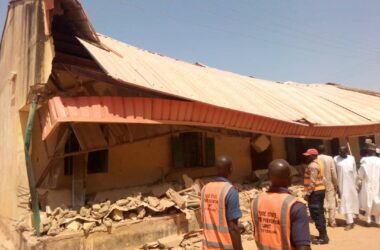The Senate has raised alarm over the continued loss of lives across parts of Nigeria, saying citizens are growing weary of living in constant fear and mourning. The lawmakers expressed their frustration after reports emerged of another deadly attack in Benue State, where gunmen reportedly killed about 200 villagers.
Speaking to journalists in Abuja on Tuesday, the Chairman of the Senate Committee on Media and Public Affairs, Senator Yemi Adaramodu (APC, Ekiti South), addressed the recent attack in Yelewata, Guma Local Government Area of Benue State, which occurred on the night of June 13, 2025.
Senator Adaramodu noted the grief and pain caused by the killings, stating that both the Senate and the executive arm of government are stepping in to show unity and seriousness. He confirmed that President Bola Tinubu will visit Benue on Wednesday, June 14, to meet affected communities and assess the situation firsthand.
“More importantly, we are organizing a national security summit not just for the military, but for CSOs, media, women, youth, and other critical stakeholders because enough is enough. We cannot keep going from Plateau to Benue, paying condolence visits.
“We are tired of mourning. The time has come to act. Security is local, and locals must be part of the solution. With Mr. President’s support, the Senate and the House have appropriated adequate funds to support the military and security agencies. Together with traditional rulers and communities, we must put a stop to this bloodshed.
“Tomorrow’s visit to Benue will signal that the government is serious, both the legislature andthe executive. When we hold the national security summit, we hope to uncover hidden problems and find lasting solutions to the killings of innocent Nigerians, not just in Benue or Plateau, but across the country.
When asked why yes votes and not electronic voting by the Senators to give credence to state of emergency in Rivers State by President Tinubu, the Senate Spokesman who noted that the issue was debated in closed-door sessions concerning Rule 131, 132, and 134 of the Senate Standing Orders, said that once a decision is reached in a closed session, it cannot be reopened in plenary.
On Emergency Rule Voting, Adaramodu said, “About voting to endorse the emergency rule: yes, I’m eager to answer that. But first, when we were electing our presiding officers, the rules hadn’t come into force yet. The rulebooks were only handed over after the presiding officers were elected. That’s why the process for electing presiding officers is different from regular legislative procedures.
“Regarding emergency rule: there was a communication from Mr. President on June 12 it was read. And we followed procedure. When it comes to sensitive issues like security, our Standing Orders say such matters must be debated in closed-door sessions Rule 131, 132, and 134. Once a decision is reached in a closed session, it cannot be reopened in plenary.
“Everyone is now a lawmaker, a lawyer, a coach, questioning what they don’t know. But the rules are clear. During the closed session, we debated for three to four hours. Once an agreement is reached, it’s final. The presiding officer then comes back to plenary and puts the question: “Do we affirm what was agreed in the closed session?” Everyone said “Yes.” No one said “No.” That’s where it ends.”
Answering questions on how many times the Senate ought to sit and how many times the Senators sat, Adaramodu explained that the Senate is supposed to sit for 181 days out of 365, which is nearly half the year and that they have sat for more than that.
He said, “In a legislative year, now let’s say 24 months — how many days are we supposed to sit? In 24 months, how many days have we sat? Some say we go on frequent holidays. But we’re supposed to sit for 181 days out of 365, which is nearly half the year. In the Senate, we sit for more than that. We meet the milestone.
“When you talk of holidays, note this: the Senate is not only for plenary sessions. We also sit on committees, conduct oversight functions. But even in plenary, we ensure we meet our milestones. You can check our register. There are months we don’t have any holidays at all.
“Our holidays fall only during public holidays or statutory legislative breaks. When all those holidays are put together Christmas, Easter, etc, they are not even up to two months or three months. So, if we sit for six months out of the twelve, constitutionally we’ve exceeded our mandate. We do that.”
Speaking further, Adaramodu said that in the last twenty- four months, 844 bills were received, out of twenty five became laws following their passage and being assented to by the President, four hundred for second reading, two hundred for first hearing and one hundred and seven at conference committee stage.
On the processnof passage of a bill, he said, “In the passage process, we now have a joint committee of both chambers. After that, they pray, come together with the aggregators, and then we take the documents back for revisions. Once that’s done, we aggregate. After passage, both chambers now come together to harmonize and write everything into a single document. Then the CNA — which is the Clerk of the National Assembly — will sit on that.
“Only after this process can the Senate President and the Speaker of the House of Representatives sign it. Then it is transmitted to the President, who will now assent. You know, it was just about two weeks ago that the two chambers passed the bills. Before the concurrence meeting, before the CNA, and before the President of the Senate and the Speaker of the House of Representatives could give their signatures — it’s not something that takes two or three days.
“At every stage, especially when dealing with the budget, the legal departments of both chambers examine the bill again to check if it conforms to existing laws, to avoid sending something to the Presidency that will come back. Even after passing it to the Presidency, the same careful process applies. So, there’s no problem. It is simply due to the process.
“Now, the bills have been signed by both the Senate President and the Speaker. It has left their hands and is now on the way may be in transmission. Wait, wait. I think we’ve transmitted it. Yes, the bill has now been transmitted. I can confirm that: the bill has now been transmitted to the executive.”
On Legislative Powers and Probes, especially on the incident of June 12 at plenary where it was not a proper session, but letters from President Tinubu on appointments in Rivers State were read by the President of the Senate, Senator Godswill Akpabio, Senator Adaramodu said, “Our rules allow us to suspend proceedings to take up important matters. A motion can be moved and seconded for this purpose. These were probes, yes. But our job is to make resolutions, not to enforce arrests. We don’t have power to put a rope on the neck of an errant officer — we highlight issues and expect action to follow.
“In the 10th Senate, when we initiate probes, we do so purposefully. For example, there was an issue with a medicine probe — we discovered midway that what we were pursuing had been addressed due to the pressure from the probe. That’s how some probes become inconclusive. Once the desired result is achieved, the committee reports back. Not all outcomes require a dramatic public conclusion.
On Previous Government and Economic Issues, the Senate Spokesman said, “some offenses being probed now were committed by the past government. For example, we discovered hidden debts that harmed our economy. But when the current government came, they acknowledged and started fixing them. That’s why we don’t need to carry coal to Newcastle, the problem is being solved. The 30% allocation that was contentious before, we brought it back to 5%. So, there’s no reason to cry foul. No need to dramatise something already being fixed.”










